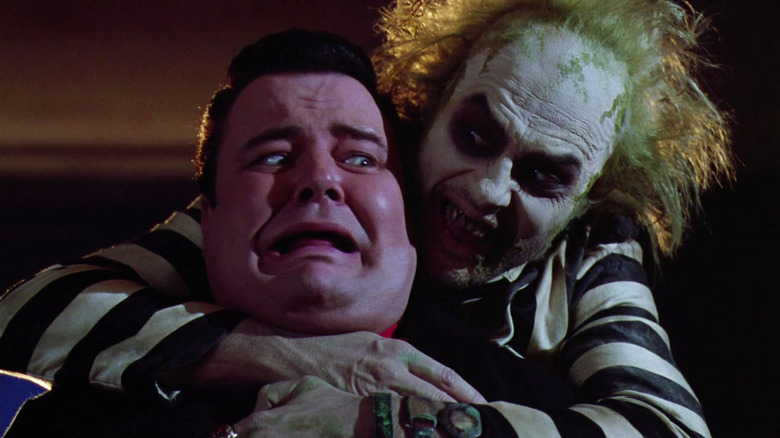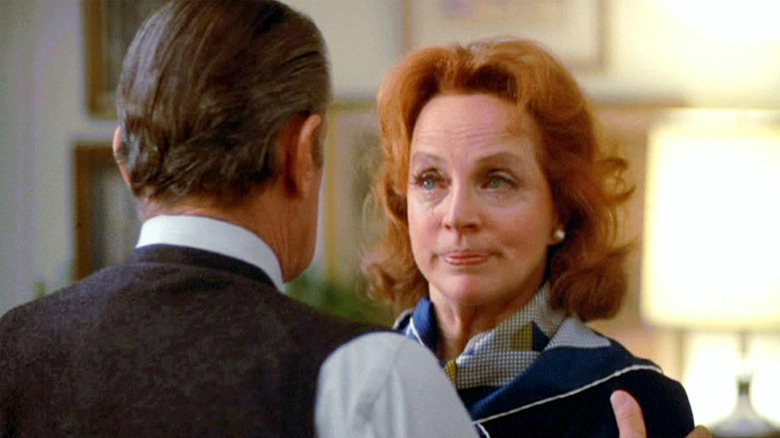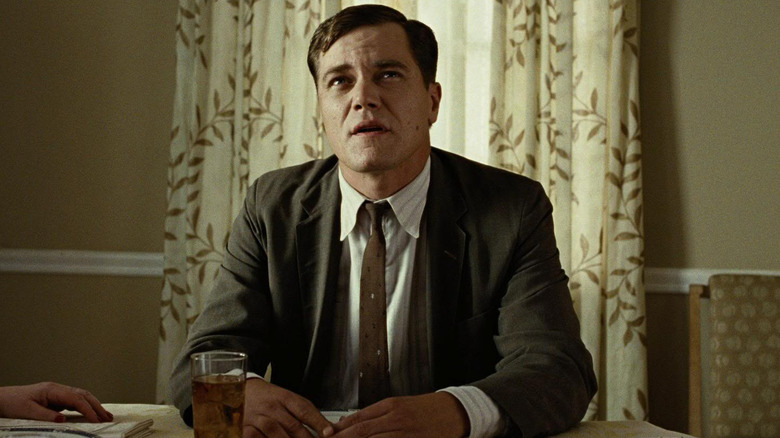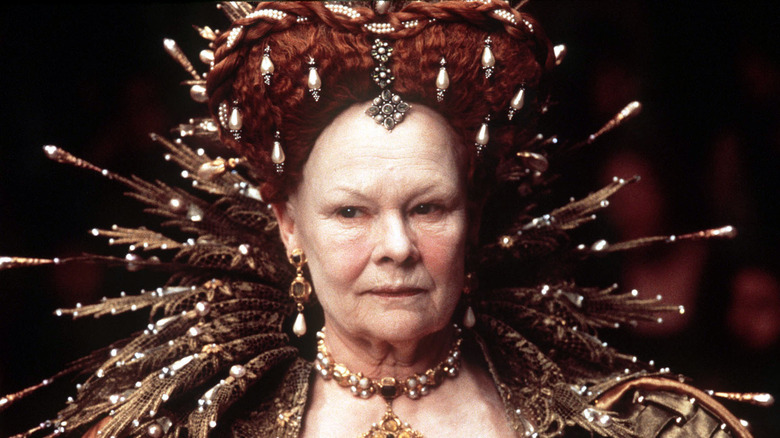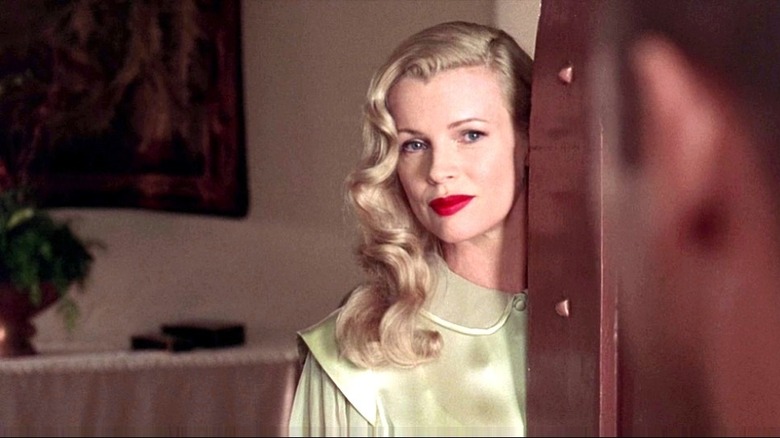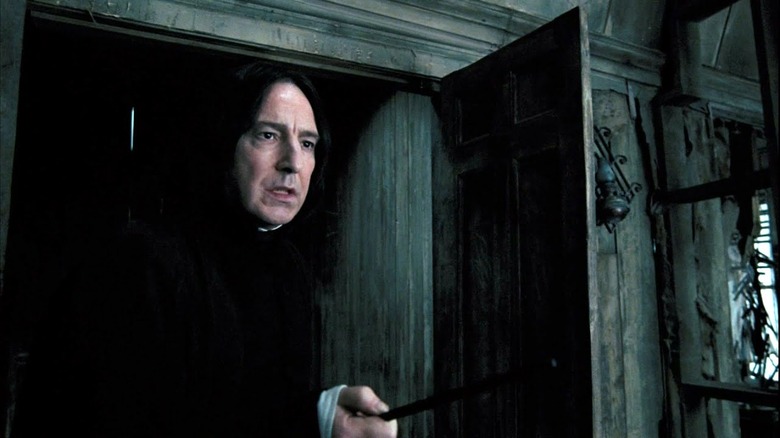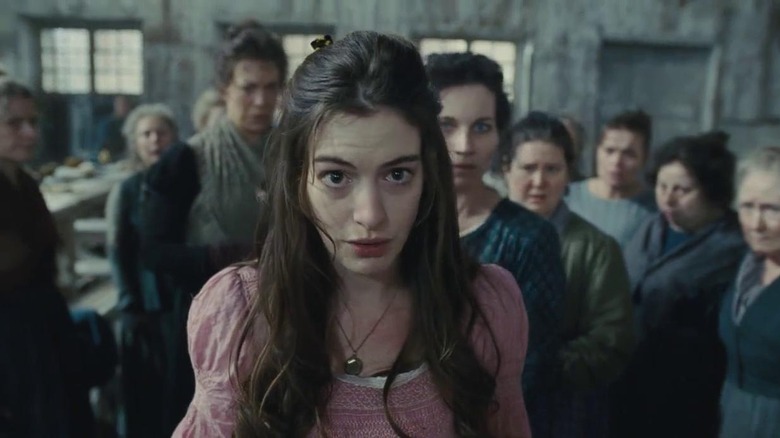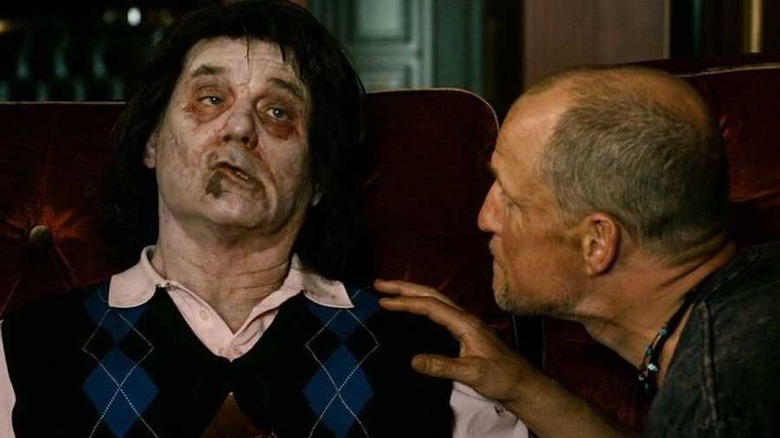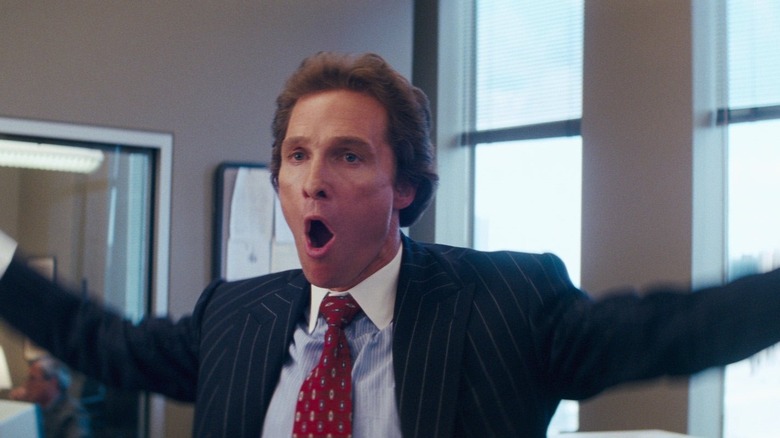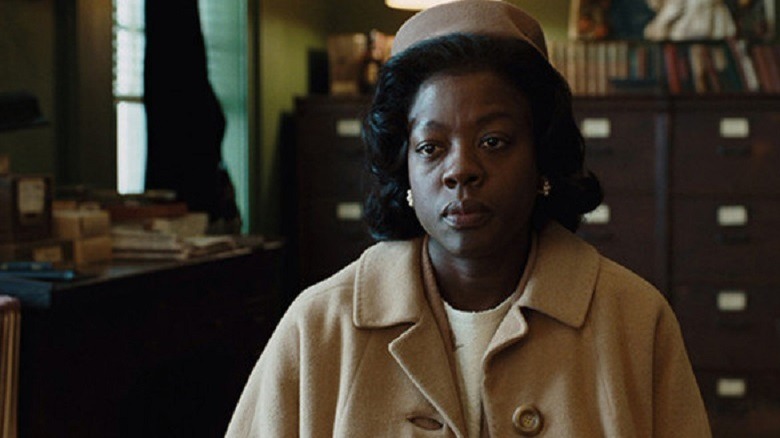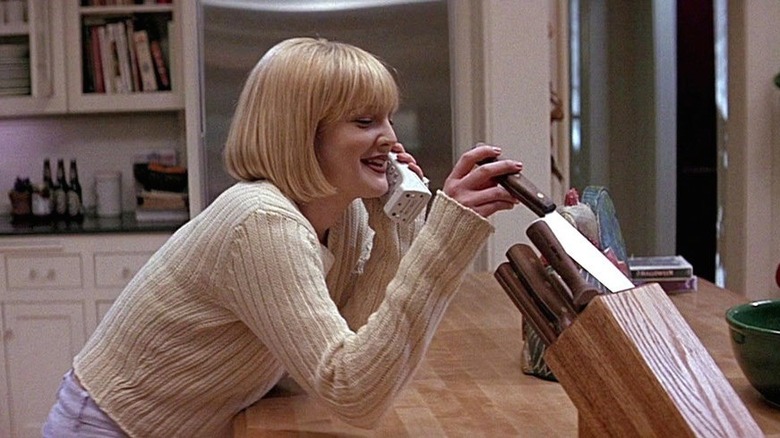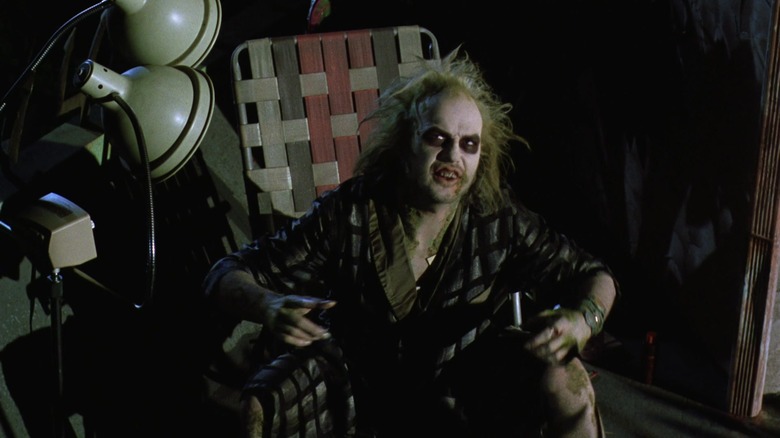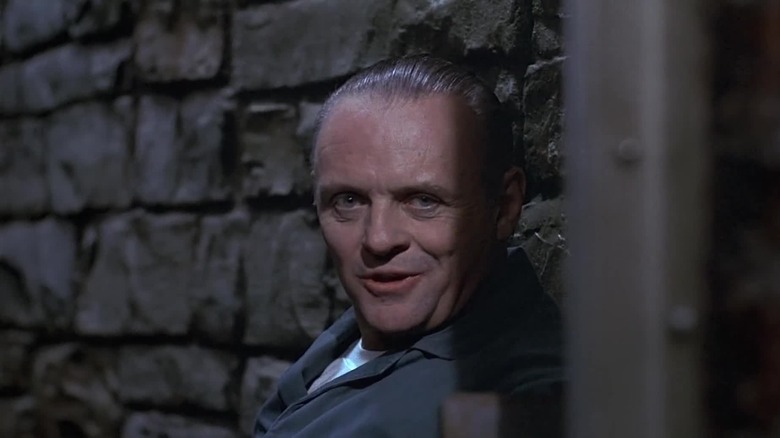The Best Iconic Movie Performances With Less Than 20 Minutes Of Screentime, Ranked
This month marks the return of one of the most twisted beloved modern movie characters: Betelgeuse. Of course, we all know the bio-exorcist by his easier-to-spell name, Beetlejuice. After over three decades, Beetlejuice is back with the long-awaited and appropriately named sequel "Beetlejuice Beetlejuice." You already know that most (though not all) of the cast of the original 1988 Tim Burton horror-comedy is back, including Michael Keaton as the Juice himself. One big talking point Keaton has hit on in the pre-release marketing is that, in all the years of development, he pushed hard to ensure that his character was...not in a lot of the movie. It's not just false modesty — Beetlejuice is only in 17 minutes of the movie bearing his name, but he makes a massive impact all the same. And Keaton's performance as Beetlejuice is just one of many that manages to be memorable and iconic without being overbearing. As we await "Beetlejuice Beetlejuice," let's count down the 12 best performances that were immediately classic without having a lot of time on screen.
(And yes, don't worry, Beetlejuice is on here.)
12. Beatrice Straight, Network
The bleak 1976 satire "Network" hovers over the modern media landscape for so many reasons that we just don't have time to get into during a ranking like this. Aside from its disturbing commentary on how the media dominates the lives of its participants, "Network" is host to a handful of notable performances that make a huge impact on the audience and the story without actually overstaying their distinctive welcomes. There's the late Peter Finch as the unstable news anchor Howard Beale, who exhorts his audience to stick their heads out the window and shout "I'm as mad as hell and I can't take it anymore!" Finch won the Best Actor Oscar posthumously, and is only in about 35 minutes of the film. There's also the immensely talented Ned Beatty as a terrifying executive who keeps Beale on the air because it makes for excellent ratings and high ad rates. Beatty got an Oscar nomination despite only appearing in one scene for about six minutes.
And then there's Beatrice Straight, who plays the beleaguered wife of the film's ostensible lead character, Max Schumacher (William Holden). Straight, like Beatty, is in just one scene of "Network," as she savages Max for his various dalliances after which they agree to separate. Straight's only in about five minutes of the film, yet still made such an impact that she, too, won an Oscar for Best Supporting Actress. No doubt, her victory was partly a sign of how arresting the Academy found "Network," but it was also a commentary on how effective she was in embodying a woman who had simply had enough of the misogynistic ways in which she was expected to let her husband mess around on her because that's how men behaved in the 1960s and '70s. As wild as it may be to see a one-scene role walk away with an Oscar, it's a testament to Straight that she deserved the win.
11. Michael Shannon, Revolutionary Road
Michael Shannon was far from an unknown when he appeared in a supporting role in the 2008 drama "Revolutionary Road." (Among his many titles, he made his debut in the 1993 comedy "Groundhog Day," though if you blink, you may miss him.) But as the odd and off-putting John Givings, Jr., Shannon made a serious impact appearing opposite two of the biggest movie stars in the world, who were also reuniting after having co-starred in the massively successful "Titanic." In short, you'd have to be a hell of an actor to steal the show from Kate Winslet and Leonardo DiCaprio, and Shannon is exactly that kind of actor. Though he's still waiting to get a richly deserved Oscar, Shannon got his first nomination as Givings despite appearing in just about nine minutes of the Sam Mendes adaptation. Givings is presented to us as a man recently removed from a mental institution, but during his brief time on screen, John is just about the only person who seems to understand the emotional tension roiling in the marriage between Frank and April Wheeler (DiCaprio and Winslet), often more than they seem to. But John is also a man without a filter, and Shannon's work heightens the sense of discomfort that Frank and April feel towards him. Shannon's career was solid before this 2008 film, but his work in the film was undeniable and unforgettable (even if the story around him felt a bit overdramatic).
10. Judi Dench, Shakespeare in Love
By 1998, audiences around the world had become familiar with Judi Dench, either due to her appearing as the new M in the then-modern James Bond movies or through costume dramas like the 1998 Best Picture winner "Shakespeare in Love." We can debate another day whether or not that John Madden-directed film should have won the big award at all, but its success was so widespread that, just like the aforementioned "Network," it netted an acting award for very little screen time. Dench plays Queen Elizabeth I in the film, which depicts the creation of William Shakespeare's most iconic tragedy, "Romeo and Juliet," amidst his own love affair in the late 1500s. Although the Queen is ...well, the Queen, she's only in about eight minutes of the film, and yet it was enough to get Dench a golden statue of her own. Argue all you like about whether such short performances are truly worth the Oscar, because what matters most is how effectively and in such brief time Dench is able to carve out an actual character in playing a well-known historical figure. Dench merely has to use her powerful and steely gaze to communicate so many emotions that you can understand why people were so obsequious and well-mannered around her fierce monarch.
9. Kim Basinger, L.A. Confidential
The nature of an excellent supporting performance is that it can't dominate the overall proceedings too much, lest the audience focus on the side of the story as opposed to its center. But more than 25 years removed from the 1997 film noir adaptation of "L.A. Confidential," it's difficult to be anything but swept away by its key supporting performance from Kim Basinger. The luminous star won the Best Supporting Actress Oscar that year, a feat that was all the more notable because it felt like one of the few times any film was able to beat out "Titanic." (Kathy Bates was nominated for her work in that film as Molly Brown.) As Lynn Bracken, Basinger imbues humanity and life in a character who could easily seem like cheap window dressing in the hands of a different actor and writer (the latter was director Curtis Hanson). Bracken is a high-class sex worker who deliberately looks like a double for the famous actor Veronica Lake, but even in her 15 minutes of screen time, Basinger makes Bracken a fully human character worthy of the respect and love she receives from L.A. cop Bud White. If there's anything surprising in hindsight, it's less the deft work from the talented Basinger and more that Bracken is able to have some semblance of a happy ending — as opposed to ending up as a chalk outline for the cops to investigate. Still, that speaks to how instantly you feel for her character thanks to the deservedly award-winning work onscreen.
8. Alan Rickman, Harry Potter and the Prisoner of Azkaban
As ridiculous as it may seem, Alan Rickman is in a shockingly small amount of the "Harry Potter" films despite playing one of its most crucial characters: Severus Snape. If you add up all the screen time he has across eight films, you'd wind up with just about 43 minutes, including the nearly six minutes he has in the excellent 2004 adaptation of the third book in the franchise. In the first two stories (either on the page or the big screen), Snape seems like nothing more than just the one professor at Hogwarts who Harry and his friends Hermione and Ron are going to have to suffer through seven years of school. He oversees the one nasty-seeming house and he seems particularly antagonistic towards our bespectacled hero. It's in "Azkaban" that we get an idea not only of why Snape so despises Potter, but also how his own schoolboy days have created a mental complex in him that allows him to both weirdly assist our trio without any of them realizing it (why else would he exhort students to read up on werewolves if not to clue them into Lupin's background?) and seek out revenge against the grown men who bullied him as a youth. That Rickman is a constantly fascinating and arresting screen presence should come as a surprise to no one, but his brief, powerful work in "Azkaban" went a long way to building up the multi-faceted Snape in ways the page never could.
7. Anne Hathaway, Les Misérables
If you love the stage musical "Les Misérables," you know that the character of Fantine is meant to have limited time by design. The beautiful but beset-upon Frenchwoman lives a miserable life, scraping by so she can send money to an innkeeper who tends to her sick daughter, eventually selling her own hair for a few centimes and then dying soon after. For the 2012 adaptation directed by Tom Hooper, the A-list movie star Anne Hathaway went as hard as she could, receiving a rough haircut onscreen and then belting out the iconic "I Dreamed a Dream" number with Hooper's camera sitting uncomfortably close to her teary face. In many ways, Hooper's cinematic approach could have heightened only the flaws of having actors sing live (and it arguably does that often). But Hathaway is effectively committed to making us care about Fantine, as outrageously depressing as her life is. Hathaway faces off against the challenge of having the camera strip her bare and walked away with an Oscar for her 15 minutes of screen time. In the hands of another actor, Fantine would've been laughable, but Hathaway makes her truly sing.
6. Bill Murray, Zombieland
The 2009 horror comedy "Zombieland" was surprisingly enjoyable to start with, blending fast-paced action and comedy with blood and guts. But then, in its third act, the film veers into the world of meta-comedy and does so with delight and élan. The core group of characters head out to the Hollywood Hills and directly into the estate of comic legend Bill Murray, where they're stunned to find that Murray himself is still alive and well, even though he's dressed himself up as a zombie to hopefully avoid getting his brains eaten by the real things. His time in the film is short because the nerdy lead (Jesse Eisenberg) is fooled by the costume and thinks Murray has already been turned. But in his five minutes on screen, Murray not only reunites with Woody Harrelson (a long way from the bowling comedy "Kingpin"), but he also gets to riff on some of his past roles, like admitting that one of his only regrets would be playing the lasagna-loving cartoon cat Garfield. It's not shocking that Murray would briefly return in the forgettable 2019 sequel "Zombieland: Double Tap," but lightning did not strike twice. Some gags are only hilarious the first time around, and this is one of them.
5. Matthew McConaughey, The Wolf of Wall Street
Matthew McConaughey had an enviable mid-2010s; his star rose thanks to some Oscar-winning work and season 1 of the instantly compelling HBO crime drama "True Detective," as well as his equally fascinating cameo in the epic real-life blend of comedy, satire, and fury known as "The Wolf of Wall Street." Based on the outlandish true story of Wall Street trader Jordan Belfort, "The Wolf of Wall Street" is, like many of Martin Scorsese's best films, unsparing in its depiction of toxic masculinity and greed, and those qualities are first exemplified not by Belfort, but by a mentor of sorts: Mark Hanna. Hanna seems as much a product of the film's script as it is a depiction of McConaughey's own quirky behavior, in part because his big scene, a lunch with Belfort, was partly improvised so that the laid-back and laconic Texan could chest-thump his way into iconography. "The Wolf of Wall Street" is a massive film, clocking in at three hours, and McConaughey's only in about five minutes, yet he merited a credit in the film's trailers in part because he was on a tear and in part because he made his presence known in spite of it being a glorified cameo.
4. Viola Davis, Doubt
There was once a time when people didn't know that Viola Davis could act Meryl Streep off the screen, but then we all saw "Doubt" and had such, well, doubts erased from our minds. Based on the play of the same name, "Doubt" focuses on a nun (Streep) who becomes convinced that the Father (Philip Seymour Hoffman) at her parish is involved in a relationship with a young boy. At one point, the nun confronts the boy's mother (Davis) with her beliefs, only to be surprised to learn that the mother knows her son is gay and is terrified that his father may abuse the boy if the truth is revealed. As Mrs. Miller, Davis displays a shocking blend of ferocity and ambivalence, caring as deeply for her son even if she doesn't understand him, as she's infuriated at Sister Aloysius for her inability to let her beliefs go. Davis only has the one scene in "Doubt," in part because that's the nature of the source material, but her work unsurprisingly netted her an Oscar nomination. Davis had appeared in other films, such as "Solaris" and "Antwone Fisher," but "Doubt" is the film that fully established her credentials not only with the acting community, but also with a wider audience that was enraptured by her magnetic charisma.
3. Drew Barrymore, Scream
We're fast approaching the 30th anniversary of the first time anyone was asked on screen what their favorite scary movie was. That question is posed first to Casey Becker, played in the opening 15 minutes of the Wes Craven film "Scream" by Drew Barrymore. Just as "Scream" is one of the best horror movies of the last 30 years, Barrymore's extended cameo as the first person to face off against the mysterious and bloodthirsty Ghostface (spoiler: she does not win) is the kind that not only helped establish an entire franchise, but also helped give her career a new gust of energy. Just two years later, she would appear opposite Adam Sandler in the romantic comedy "The Wedding Singer" and revitalize herself even further. In "Scream," Barrymore simply excels at a straightforward character who helps make us understand the stakes of the film just as it's starting. As audiences in 1960 were shocked to see the famous Janet Leigh get killed off halfway through "Psycho," so too was a younger generation stunned to see the grown version of the girl from "E.T." get gutted by a masked figure so early. If Barrymore could die, anyone could.
2. Michael Keaton, Beetlejuice
It really is pretty stunning to consider that Michael Keaton is in just 17 minutes of the 1988 classic "Beetlejuice" — because as soon as he arrives, he's impossible to forget. But despite its name, "Beetlejuice" is about Adam and Barbara Maitland (Alec Baldwin and Geena Davis), a couple who die far too young and are horrified to learn that their house has been purchased by New York yuppies from the art world. Eventually, at their wits' end, they enlist Beetlejuice to scare the family away, only to realize he's out for himself. Keaton is going extremely big as Beetlejuice, not just courtesy of the striking costume and makeup but also via Keaton's raspy voice and cartoonishly large physicality. He leaps from sarcasm to desperation like a truly scummy salesman, making the ghost with the most into someone you cannot help but love as much as you know you should hate him. Yes, Keaton's not in much of this movie, but the very fact that you miss him when he's gone is a sign of how great his performance is, and how much range he has. Hard to believe that a year later, this guy was playing the Caped Crusader.
1. Anthony Hopkins, The Silence of the Lambs
Anthony Hopkins was not the first actor to play Hannibal "The Cannibal" Lecter, a whip-smart and vicious killer whom the young FBI agent Clarice Starling relies on for advice in the 1991 thriller "The Silence of the Lambs." Nevertheless, it's next to impossible to think of another performer who brought someone so savage to life in so little time. Despite only appearing in the Jonathan Demme film for about 17 minutes, Hopkins walked away with the Best Actor Oscar precisely because every moment he has feels instantly enshrined in legend, from his lilting tones behind thick glass to being strapped on a special gurney to teasing a governor to even getting through emotionally to Starling so that he (and we) can better understand her haunted past. Hopkins was not an unknown when he appeared in the film, but became a star as soon as he cheerfully let Starling know that he had a census taker's liver with some fava beans and a nice Chianti. (You know the sound effect that comes next.) Hopkins hasn't had a role quite as delectable ever since, but how could he? Hannibal is one of those indelible screen creations that only comes along once in a blue moon.
